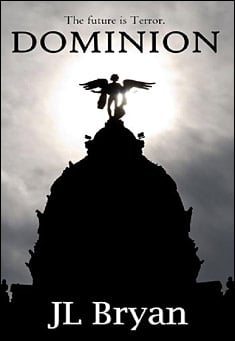In the year 2036, the United States of America is ruled by a totalitarian regime controlling all information: education, religion, the mass media, and the internet.
Daniel Ruppert set out to be a journalist, but ended up a talking head for a global propaganda-news network. Weary of deception, Ruppert begins searching for the truth on his own. His urge to know puts his life at risk as he discovers the clandestine North Atlantic Psychological Command (PSYCOM) and how it manipulates the minds of the Western world. He's following the trail of PSYCOM's darkest secret--and he'll find it, if he can survive.
Excerpt:
Daniel Ruppert left the steel-reinforced black dome of the GlobeNet, Los Angeles studio and drove into the war-torn concrete hell of south L.A. The roads deteriorated beneath him as he traveled deeper into the Economic Reclamation Zone, where the Western Resources and Energy Committee now permitted up to four hours of electricity a day and as much as two gallons of water per household, a bid to stave off riots as the National Guard effected its latest withdrawal. Another intervention would likely follow within the month. Ruppert would report on it ominously, while framed by footage captured by the triangular GlobeNet spycams that glided like tight swarms of black vultures over newsworthy sites.
On this evening’s newscast, Ruppert had described the new measures as a “bold initiative to increase prosperity and opportunity for the citizens of Southern Los Angeles.” Privately, he’d wondered whether “increase” was the proper word, since it implied that those things existed in the first place. The word, like the overall positive tone of the story, had been chosen by network, and a mere reporter had no place suggesting revisions. Ruppert was just a face-man, someone who could look trustworthy and reassuring regardless of what he said, or how much he lied.
His new 2035 Ford Bluehawk stuck out like a golden thumb as it raced low and sleek along the shattered 405, picking up speed each time he darted under a wrecked overpass bridge. Scavengers sometimes lurked in the shadows beneath bridges, waiting to snare a promising target using a homemade explosive tucked into a roadway fissure, or maybe an old-fashioned burst of machine gun fire. At least, this was the kind of thing Ruppert reported for the local news. The boundary between the true world and the one manufactured for the audience was slippery and porous, even for him, especially since he didn't know when he told the truth and when he didn't. It was all just script.
Garbage and earthquake rubble buried most of the ramps on this stretch of interstate. Up the ramps, behind the rusty barbs and chain link running alongside the highway, most of the old concrete buildings stood lightless except for the occasional red glare of an open fire in a window hole. The four hours of electricity was probably an exaggeration. More likely, the Western Resource and Energy Committee provided one hour, or no hours at all—most likely, they had simply issued the announcement to assure security-enclave residents in Beverly Hills and Orange County that something was being done for the benighted masses of the south.
In three or four weeks, he would be reading a new statement for the cameras—that the residents of South L.A. had sabotaged the transformers and power lines, or had used the new electricity to fuel insurgent activity, and the power needed to be cut once again. Over iced drinks on manicured golf courses, where groves of trees concealed the electrified razor-wired fences, Ruppert’s colleagues would shake their heads and comment on how you just couldn’t help those people.




